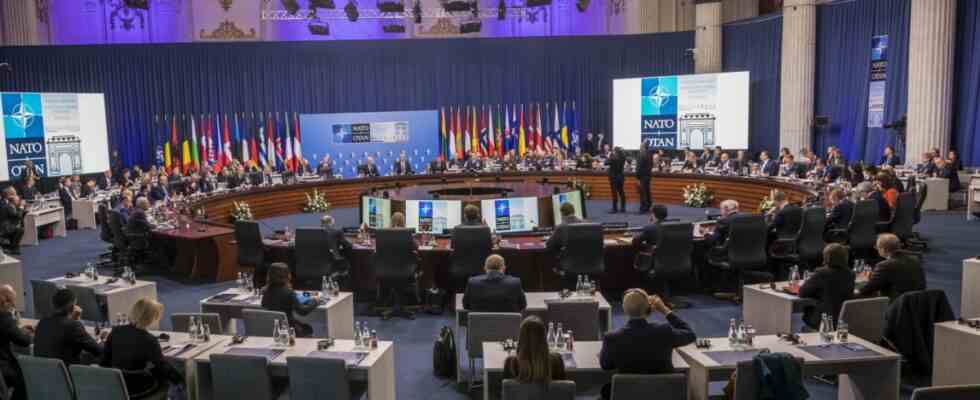It is a historic place where the foreign ministers of the 30 NATO countries and the candidate countries Sweden and Finland met for their regular autumn meeting this Tuesday in the Romanian capital Bucharest. The communist dictator Nicolae Ceauşescu had the Palace of Parliament built between 1983 and 1989 as a symbol of his power – it became the seat of Romanian democracy. And the location of one of the most controversial decisions by the western defense alliance to date.
At their summit meeting in 2008, the heads of state and government granted Ukraine and Georgia the prospect of membership as part of the “open door policy”. At the same time, however, Chancellor Angela Merkel and French President Nicolas Sarkozy blocked Ukraine’s rapid accession – a “miscalculation” with serious consequences out of consideration for Russia, as Ukrainian President Volodymyr Zelensky once bitterly said. Critics of the then US administration under President George W. Bush see the American advance as a factor in Russia’s war against Georgia and also in the later attacks on Ukraine.
Then as now, the ruler in the Kremlin was Vladimir Putin. It is his war of aggression that has led to the alliance’s foreign ministers meeting for the fifth time “in this brutal year of 2022,” as Federal Foreign Minister Annalena Baerbock puts it. The aim of the meeting is to work together to ensure “that the people of Ukraine get through the winter,” she adds, after the Russian President is “now using cold as a weapon of war” – the Greens accuse a “break with our civilization”. politician Putin before; a phrase similarly often used in relation to the Holocaust.
While the ministers are landing, there is an air alert in Ukraine
What “bombing of infrastructure” means in abstract terms can be visualized when people imagine: “How long would you and your family, with your small children, endure without electricity, without water, without heat” in sub-zero temperatures? Only in the night did Russian rockets hit the city of Dnipro again. While the ministers landed in Romania, Ukraine triggered nationwide air alerts.
NATO Secretary General Jens Stoltenberg also campaigned for the delivery of additional air defense systems. The best protection for Ukraine’s infrastructure is to shoot down as many incoming Russian missiles and drones as possible, he said. However, weapons will continue to be supplied bilaterally, coordinated by US Secretary of Defense Lloyd Austin.
The foreign ministers put together a NATO package with “non-lethal” support, including jammers to defend against drones, but also fuel, medical supplies and winter equipment. In addition, it must be ensured that Ukraine receives sufficient ammunition and spare parts for weapon systems that have already been delivered, said Stoltenberg.
The Ukrainian foreign minister gives a first-hand account of what is needed
However, in view of the unabated destruction of the energy supply in Ukraine by Russian rocket attacks, the pressure on the federal government could still increase patriot– to send anti-aircraft batteries from Bundeswehr stocks. Defense Minister Christine Lambrecht (SPD) had offered Poland a secondment after the rocket hit its territory – whereupon her colleague Mariusz Błaszczak suggested without any agreement that the systems should be made available to Ukraine. the Patriots are intended to defend the alliance, Baerbock affirmed. However, Stoltenberg had made it clear that NATO would not refuse a delivery.
Baerbock, as G-7 chair in Bucharest, also convened an expanded format meeting with around 20 countries to coordinate winter aid for Ukraine; the group was formed a few weeks ago at the G-7 foreign ministers’ meeting in Münster. The main aim is to procure transformers and bring them to the Ukraine in order to be able to repair and stabilize the power grid there. In addition, generators are to be delivered on a large scale in order to be able to supply cut-off areas with electricity, but also blankets, mattresses, fuel and hygiene products and food. US Secretary of State Antony Blinken pledged $53 million, and the German government €58 million, after having previously pledged €100 million to international organizations for humanitarian aid. On December 13, France is hosting a conference in Paris where donors are expected to make further pledges.
At a working dinner with their Ukrainian colleague Dmytro Kuleba in the evening, the ministers wanted to hear first-hand what the government in Kyiv needs. Kuleba reiterated the desire for defense systems: “Patriots and transformers are what Ukraine needs most,” he said. NATO Secretary General Stoltenberg had confirmed that Ukraine’s path to membership in the alliance was still open – Ukraine’s support from NATO is probably the value of this promise -Measure states, especially with weapons.

